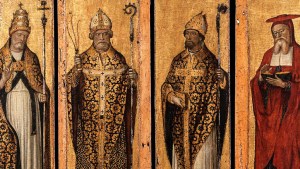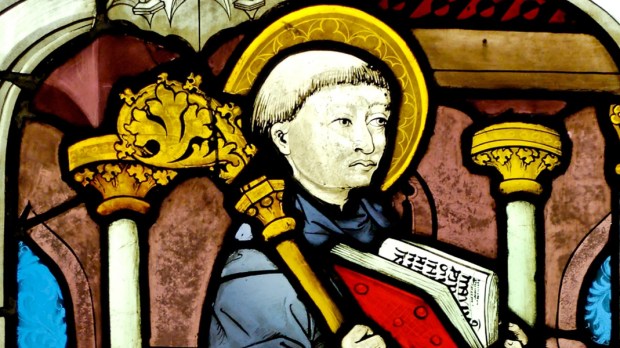There’s a deleted scene from Monty Python’s controversial film The Life of Brian, about a man who is mistaken for the Messiah. Three shepherds are sitting next to a fire on the night of Christ’s birth. After an extended conversation on the positive qualities of sheep, one suddenly asks the others, “Is it AD yet?” Another looks up at the sky and says, “Quarter past.”
In an otherwise forgettable scene, this is a clever joke about the fact that we label different eras of human history only in hindsight. No one was flipping their calendar over from BC to AD on the first Christmas night. Americans in the 1880s did not say to each other, “Boy, it sure is nice in the Gilded Age here, isn’t it?” The perspective of the passage of time allows us to evaluate and categorize different periods.
This same phenomenon plays out in an important aspect of Church history: What is the bookend of the Patristic Era?
The Fathers of the Church, those men revered for their proximity to the apostles, their sound teaching in the face of heresy, and their contributions to the building up of the Church’s understanding of its faith, are among the most important authorities in the Church’s Sacred Tradition. Because of their formative impact on the Church’s faith, the opinions of the Fathers carry a special weight. There are always authoritative teachers and outstanding theologians, but at a certain point, the Church becomes aware that those individuals no longer carry the authority of Fathers. For all of the respect his teaching commands, the 13th-century theologian St. Thomas Aquinas is not a Church Father. So when did the Patristic Age end? Actually, not long before Aquinas, some say.
While many will name St. John Damascene, the 8th-century interlocutor with Islam and author of The Orthodox Faith, as the last of the Church Fathers, not a few leading scholars place that title on someone who lived several centuries afterward: St. Bernard of Clairvaux, the Cistercian abbot who died in 1153.

Read more:
Who are the “Fathers of the Church” and why do they matter?
It might seem odd to think of a medieval saint as belonging to a class of men usually categorized as ancient. But this title is well-established even in official Church documents. Pope Pius XII wrote an encyclical on St. Bernard, Doctor Mellifluus, subtitled “On St. Bernard, the Last of the Fathers,” in which he quotes the editor of St. Bernard’s complete works, the 17th-century abbot Dom Jean Mabillon, who called St. Bernard “the last of the Fathers, but certainly not inferior to the earlier ones.”
Pope Benedict XVI also called him “the last of the Fathers.” In a general audience in 2009, Pope Benedict explained why St. Bernard is given this title by some.
While theologians who would live not much later than he increasingly would approach questions of faith with a philosophical method, St. Bernard, following the model of the Church Fathers, dipped into the biblical and patristic sources as his wellspring for theological reflection. Indeed, in addition to citing Scripture copiously, it was a mark of the writings of the Church Fathers to appeal to earlier Fathers: Irenaeus quoting Ignatius, Cyril quoting Athanasius, Augustine quoting Cyprian. St. Bernard did likewise.
Certainly not disparaging the work of the great scholastics who would come later, Pope Benedict describes the contribution of St. Bernard to the faith:
St Bernard, on the other hand, solidly founded on the Bible and on the Fathers of the Church, reminds us that without a profound faith in God, nourished by prayer and contemplation, by an intimate relationship with the Lord, our reflections on the divine mysteries risk becoming an empty intellectual exercise and losing their credibility. Theology refers us back to the “knowledge of the Saints,” to their intuition of the mysteries of the living God and to their wisdom, a gift of the Holy Spirit, which become a reference point for theological thought. Together with Bernard of Clairvaux, we too must recognize that man seeks God better and finds him more easily “in prayer than in discussion.”
St. Bernard reminds us of something that is both incredibly obvious yet easily forgotten: that all of our theological speculation, our whole life of faith, must be centered in Jesus Christ. As he wrote, “All food of the soul is dry unless it is moistened with this oil; insipid, unless it is seasoned with this salt. What you write has no savor for me unless I have read Jesus in it.”
It is this spirit, rooted in the Word, rooted in Christ, that animated the Fathers of the Church, and that animated St. Bernard. And for that reason, he is often counted among their number.

Read more:
How to have a prayer life beyond a prayer time

